Everything You Need to Know About Getting a Junior Driver's License in New York: A Comprehensive Guide
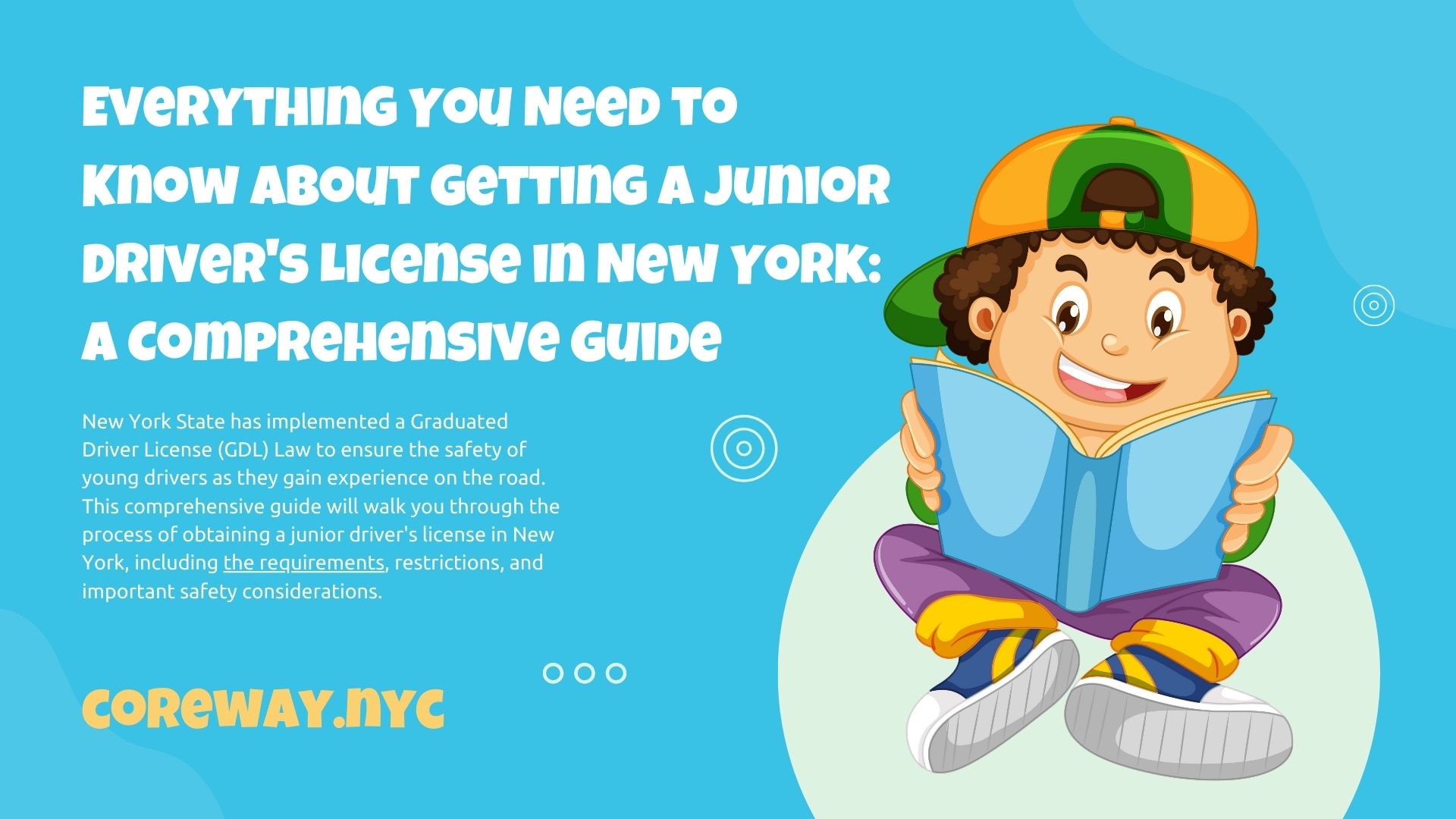
Table of Contents
- What is a Junior Driver's License?
- Steps to Obtain a Junior Driver's License
- Restrictions for Junior License Holders
- Regional Variations in Junior License Restrictions
- Penalties for Violations
- Upgrading to a Senior License
- Safety Tips for Junior Drivers
- Common Mistakes to Avoid
- The Application Process
- Preparing for the Road Test
- From Junior License to Safe Driving in New York
New York State has implemented a Graduated Driver License (GDL) Law to ensure the safety of young drivers as they gain experience on the road. This comprehensive guide will walk you through the process of obtaining a junior driver's license in New York, including the requirements, restrictions, and important safety considerations.
What is a Junior Driver's License?
A junior driver's license, also known as a Class DJ or MJ license, is part of New York's graduated licensing system. It's designed for drivers between the ages of 16 and 18, providing a stepped approach to full driving privileges.
Key Differences:
|
License Type |
Age Requirement |
Supervision Needed |
Driving Hours |
|
Learner's Permit |
16+ |
Always |
5 AM - 9 PM |
|
Junior License |
16-18 |
Varies by region |
5 AM - 9 PM (with exceptions) |
|
Senior License |
18+ or 17 with driver's ed |
None |
No restrictions |
Steps to Obtain a Junior Driver's License
1. Obtain a Learner's Permit
To start your journey towards a junior driver's license, you must first acquire a learner's permit. Here's what you need to do:
- Be at least 16 years old
- Pass a written test on traffic rules and safe driving practices
- Provide proof of identity and age
- Pay the required fee
2. Complete Supervised Driving Hours
With your learner's permit, you must complete a minimum of 50 hours of supervised driving practice, including:
- At least 15 hours of driving after sunset
- Driving under various road and weather conditions
Your supervising driver must be at least 21 years old and hold a valid New York State driver's license.
3. Take a Pre-licensing Course
Before you can take your road test, you must complete a 5-hour pre-licensing course. This course covers:
- Safe driving techniques
- Defensive driving strategies
- New York State traffic laws
- The dangers of alcohol and drug use while driving
4. Pass the Road Test
Once you've completed the above requirements and held your learner's permit for at least 6 months, you can schedule and take your road test. Upon passing, you'll be issued your junior driver's license.
Call Us Today 6AM-10PM
Or fill out the form 24/7
Our team is here to guide you with promotions, instructor availability, and the best training package for you.
Restrictions for Junior License Holders
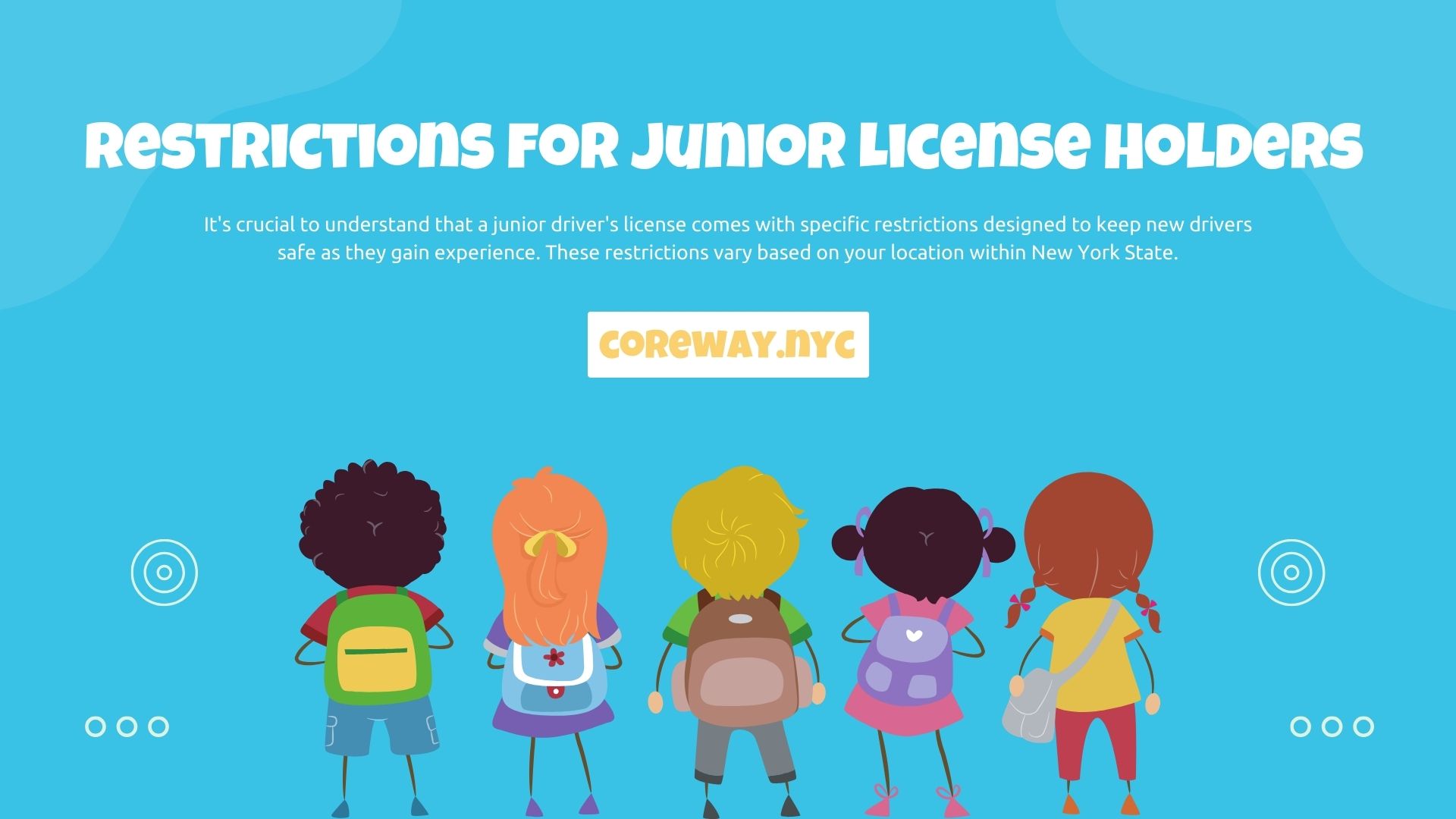
It's crucial to understand that a junior driver's license comes with specific restrictions designed to keep new drivers safe as they gain experience. These restrictions vary based on your location within New York State.
Daytime Driving Rules
For most of New York State, junior license holders can drive unsupervised between 5 AM and 9 PM. However, there are important restrictions to keep in mind:
- You can only have one passenger under the age of 21, unless they are immediate family members.
- All passengers must wear seat belts, and appropriate child safety seats must be used for younger children.
Nighttime Driving Rules
Between 9 PM and 5 AM, junior license holders face additional restrictions:
- In most cases, you can only drive if supervised by a licensed parent, guardian, or driving instructor.
- You may drive unsupervised directly between home and work or a school course if you carry the appropriate documentation.
Regional Variations in Junior License Restrictions
New York State has different rules for junior drivers depending on the region. It's crucial to understand these variations to avoid violations and ensure safe driving practices.
Upstate New York
For junior drivers in Upstate New York (any county north of New York City):
- You can drive unsupervised between 5 AM and 9 PM
- You may drive unsupervised between 9 PM and 5 AM for work or school with proper documentation
- Only one passenger under 21 is allowed unless they are immediate family members
New York City (Five Boroughs)
Junior drivers face stricter regulations in New York City:
- You cannot drive within the five boroughs at any time with a junior license
- Supervised driving is allowed between 5 AM and 9 PM with a licensed driver aged 21 or older
- The vehicle must have dual brake controls
Long Island (Nassau and Suffolk Counties)
Long Island has its own set of rules for junior drivers:
- Unsupervised driving is allowed between 5 AM and 9 PM, but only for travel to/from work, school, or driver's education courses
- Between 9 PM and 5 AM, you must be supervised by a parent, guardian, or driving instructor
- Only one passenger under 21 is allowed unless they are immediate family members
Penalties for Violations
Violating junior license restrictions can result in severe consequences. It's essential to understand these penalties to avoid jeopardizing your driving privileges.
License Suspension and Revocation
- A single serious traffic violation or two other violations can result in a 60-day suspension of your junior license
- Subsequent violations within six months of license restoration can lead to a 60-day revocation
Cell Phone Use and Texting Penalties
New York takes distracted driving very seriously, especially for junior drivers:
|
Offense |
Penalty |
|
First conviction for cell phone use or texting |
120-day license suspension |
|
Second conviction within 6 months of license restoration |
At least one-year license revocation |
Upgrading to a Senior License
As you gain experience and maintain a clean driving record, you can transition to a senior license with fewer restrictions.
Standard Path
- At age 18, your junior license automatically becomes a senior license
- All junior license restrictions are lifted
Early Upgrade Option
You may be eligible for a senior license at age 17 if you:
- Complete a state-approved driver education course
- Hold your junior license for at least 6 months
- Have a clean driving record
To upgrade, bring your junior license and the Student Certificate of Completion (MV-285) to any DMV office.
Call Us Today 6AM-10PM
Or fill out the form 24/7
Our team is here to guide you with promotions, instructor availability, and the best training package for you.
Safety Tips for Junior Drivers
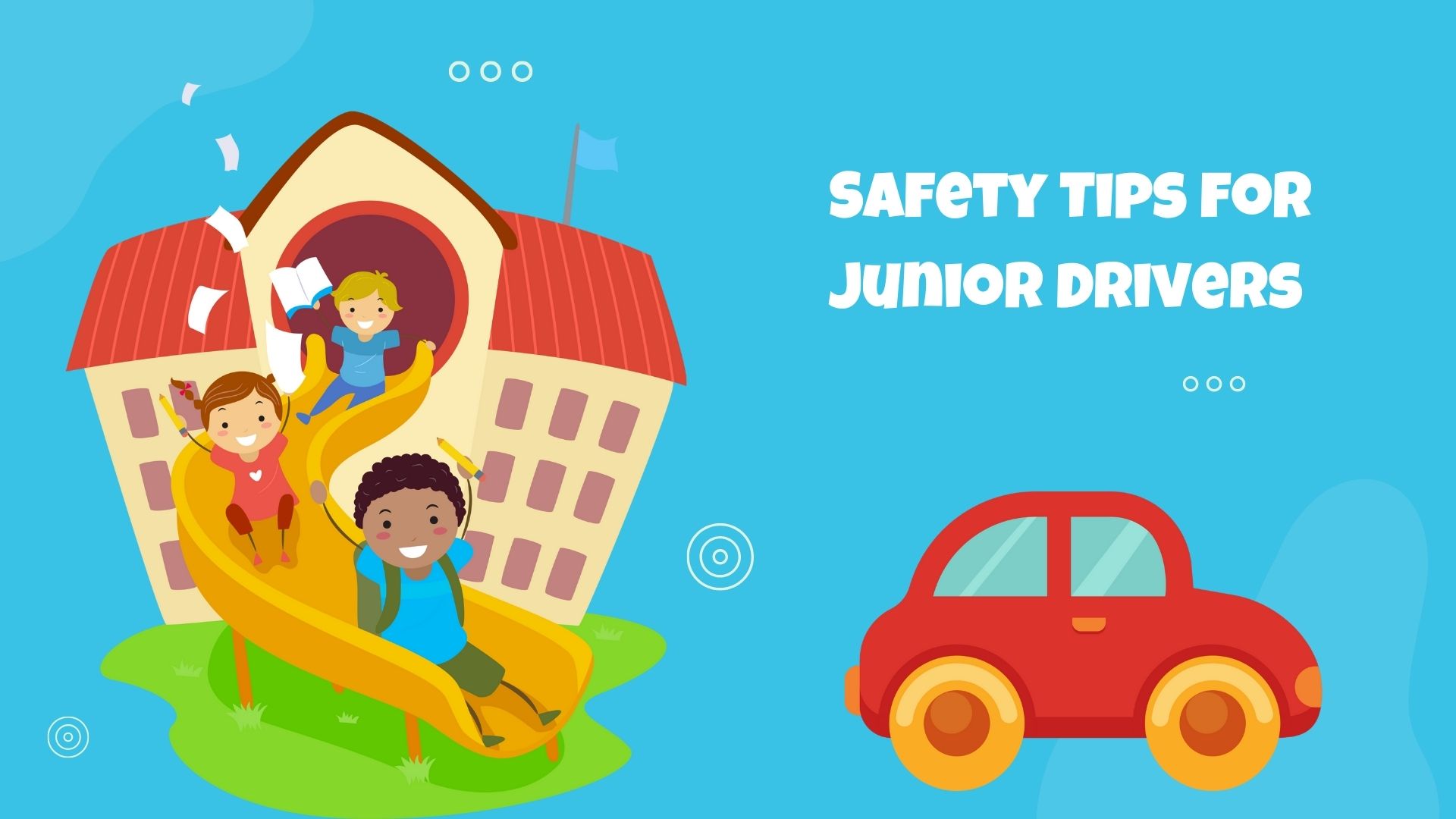
As a new driver, it's crucial to prioritize safety on the road. Here are some essential tips:
- Always wear your seatbelt and ensure all passengers do the same
- Avoid distractions: Put your phone away and focus on driving
- Obey speed limits and traffic signs
- Maintain a safe following distance from other vehicles
- Be extra cautious in adverse weather conditions
- Never drive under the influence of alcohol or drugs
Common Mistakes to Avoid
Many junior drivers make mistakes that can lead to penalties or dangerous situations. Be aware of these common pitfalls:
- Violating passenger restrictions
- Driving outside permitted hours
- Neglecting to carry required documentation (e.g., employment certificate)
- Overestimating driving skills, especially in challenging conditions
- Succumbing to peer pressure to break rules
The Application Process
Obtaining your junior driver's license involves several steps. Here's what you need to know about the application process:
Required Documents
When applying for your junior license, you'll need to provide:
- Proof of identity (e.g., birth certificate, passport)
- Social Security card
- Proof of New York State residency
- Completed Certificate of Supervised Driving (MV-262)
- Learner's permit
- Pre-licensing course completion certificate
Where to Apply
Visit your local New York Department of Motor Vehicles (DMV) office to submit your application. Some offices require appointments, so check the DMV website beforehand.
Fees Involved
Be prepared to pay the following fees:
- Junior license fee: $80 (valid for 5 years)
- Road test scheduling fee: $10
Preparing for the Road Test
The road test is a crucial step in obtaining your junior license. Here are some tips to help you prepare:
- Practice, practice, practice: Utilize your supervised driving hours effectively
- Review the New York State Driver's Manual
- Familiarize yourself with common road test routes in your area
- Ensure you're comfortable with all basic driving maneuvers
- Double-check that your vehicle meets all requirements for the test
From Junior License to Safe Driving in New York
Obtaining a junior driver's license in New York is an exciting milestone, but it comes with significant responsibilities. By understanding and following the Graduated Driver License Law, you can ensure a safe transition to becoming a fully licensed driver.
Key takeaways:
- Adhere to all restrictions based on your region and license type
- Prioritize safety and avoid distractions while driving
- Complete all required steps, including supervised driving hours and pre-licensing courses
- Be aware of penalties for violations and strive to maintain a clean driving record
- Consider completing a driver's education course for potential early upgrade to a senior license
Remember, the restrictions placed on junior drivers are designed to keep you and others safe on the road. By following these guidelines and continuously improving your driving skills, you'll be well-prepared for a lifetime of safe driving.
online five hour course Our online five hour course meets all New York State DMV requirements while offering the convenience of learning from home.
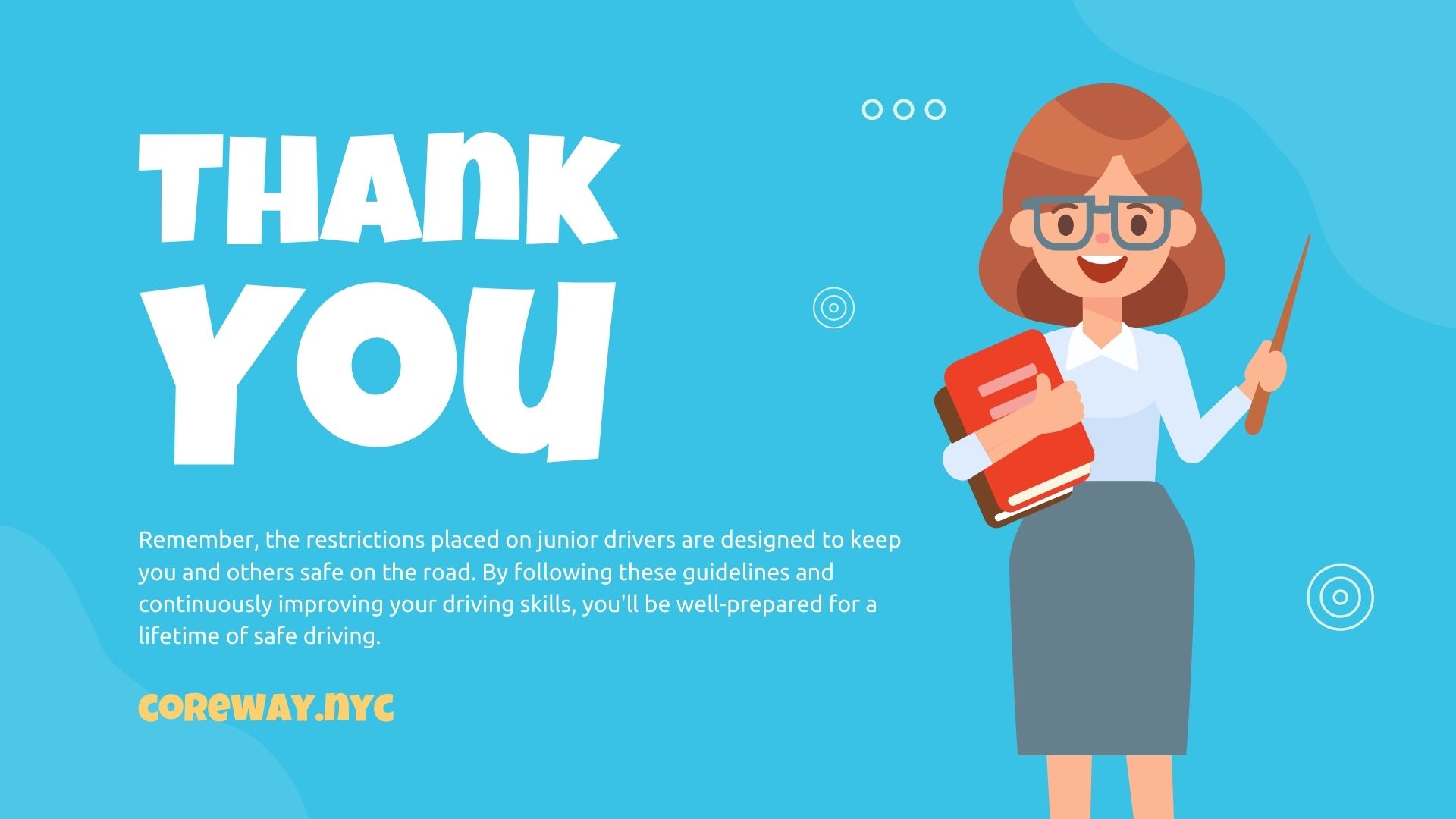
Call Us Today 6AM-10PM
Or fill out the form 24/7
Our team is here to guide you with promotions, instructor availability, and the best training package for you.
Frequently Asked Questions
-
What are the main junior license NY rules?
The main rules for junior license holders in NY include driving permitted between 5 AM and 9 PM without supervision in most areas. Only one passenger under 21 is allowed unless they are immediate family members. Nighttime driving from 9 PM to 5 AM requires supervision except for work or school-related travel. All passengers must wear seatbelts, and cell phone use and texting while driving are strictly prohibited.
-
What is the junior license NY age requirement?
You must be at least 16 years old to apply for a junior license in New York. You need to hold a learner's permit for at least 6 months before you're eligible for a junior license.
-
What are the junior license NY requirements?
To obtain a junior license in NY, you must be at least 16 years old and hold a learner's permit for at least 6 months. You need to complete 50 hours of supervised driving, including 15 hours at night. You must also pass a 5-hour pre-licensing course and the road test.
-
What's the difference between a junior driver's license and a regular license in NY?
A junior driver's license has more restrictions than a regular (senior) license. These include limitations on nighttime driving, number of passengers, and where you can drive, especially in NYC. A regular license, obtained at 18 or after meeting certain requirements at 17, has no such restrictions.
-
How do I get a junior license in NYC?
The process to get a junior license in NYC is the same as the rest of NY, but the restrictions are different. In NYC, you cannot drive with a junior license unless supervised by a licensed driver 21 or older. You'll need to obtain a learner's permit, complete 50 hours of supervised driving, take the 5-hour pre-licensing course, and pass the road test.
-
How do I get a junior's license in NY outside of NYC?
To get a junior's license in NY outside of NYC, you start by getting a learner's permit at 16. You then practice supervised driving for at least 50 hours, with 15 at night, and complete the 5-hour pre-licensing course. After holding your permit for at least 6 months, you can take the road test. Once you pass, you submit all required documents and fees to the DMV.
-
How can I get a senior license at 17 in NY?
To get a senior license at 17 in NY, you need to complete a state-approved driver education course and hold your junior license for at least 6 months with a clean driving record. You then bring your junior license and the Student Certificate of Completion (MV-285) from your driver's ed course to a DMV office and pay the required fee to upgrade your license. Remember, even with a senior license at 17, you still can't drive in New York City without supervision.
 English
English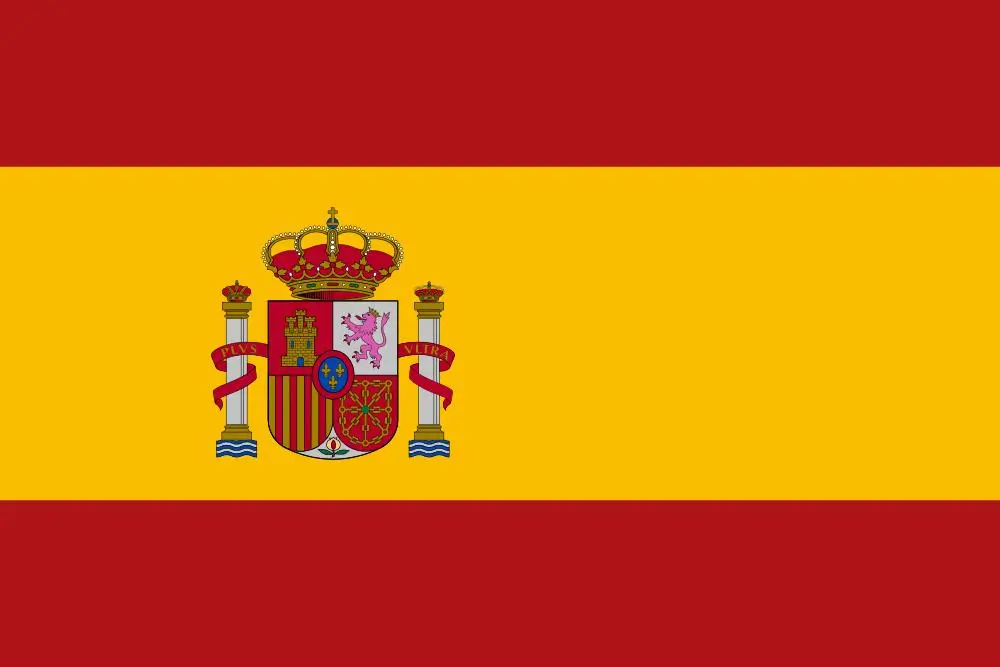 Spanish
Spanish 

